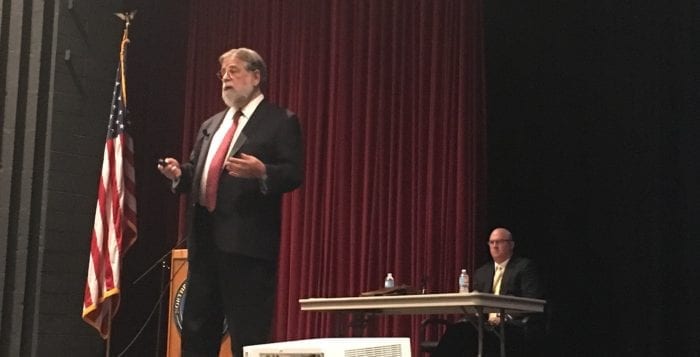
By Sara-Megan Walsh
Northport residents are gearing up for a David-versus-Goliath showdown as school district officials will call on Long Island Power Authority to uphold its promise in Suffolk Supreme Court next week.
Northport-East Northport school district attorney John Gross will present his argument May 9 on why the utility company should be forced to uphold a 1997 promise not to attempt to lower the taxes on the Northport power plant.
As both the district and LIPA’s attorneys have asked for summary judgments, or immediate decision in their favor, Gross explained at a May 1 presentation at Northport High School to the public there could be a decision made that significantly impacts district taxpayers days before the 2018-19 budget vote.
“If there is a substantial reduction in taxes, the impact shifts to the individual taxpayers,” Gross said at the May 1 presentation. “That is the threat. That is the concern of which the school district has spent a lot of time and effort combating.”
“If there is a substantial reduction in taxes, the impact shifts to the individual taxpayers.”
– John Gross
LIPA currently pays more than $81 million annually in taxes on the Northport power plant, according to a statement from the utility company. The school district receives approximately $53 million per year in tax revenue from the power plant’s taxes, which would pay for less than 40 percent of the district’s proposed $146 million tax levy for the 2018-19 school year.
“The $81 million tax burden on the Northport plant is not sustainable, especially as the output of the Northport plan is forecast to continue to decline, as more solar and wind energy is added to the electric grid,” LIPA said in a press release.
In 2010, LIPA filed a tax certiorari lawsuit against the Town of Huntington’s Assessor’s Office seeking a 90 percent reduction in the power plant’s taxes. The trial is scheduled to begin June 11.
Gross explained to residents in his May 1 presentation that Northport school district doesn’t have any standing in that lawsuit, but is a mere bystander because the Huntington Town assessor determines the assessed value of the plant, which is currently set at $30,255,550.
“The plant we believe is worth well over $3 billion,” Gross said, speaking to its fair market value.
In 2011, the district’s attorney filed a lawsuit against LIPA claiming it is the third-party beneficiary of a “promise” made in the 1997 Power Supply Agreement between LIPA and National Grid.
Gross pointed to Article 21.16 of the contract that reads the utility company, “may challenge any property tax assessment on its generating facilities or generating facility sites only if the assessment on any such challenged facility is increased not in an appropriate proportion to the increase in value related to taxable capital additions.”
The district’s attorney said he believes LIPA illegally broke contract when it filed the lawsuit against the Town of Huntington to lower taxes on the plant in 2010.
“From 1997 to today, [their taxes] have not been moved one dollar,” Gross said. “It has not been increased.”
Tax Impact of LIPA lawsuit
Assuming 2 percent school tax increase per year and average home assessed value of $3,700
If LIPA wins 90 percent reduction:
– 57.86 percent increase after 2 years
– 67.53 percent increase after 5 years
-81.33 percent increase after 9 yearsLIPA settlement offer of 60 percent reduction over 9 years:
– 9.57 percent increase after 2 years
– 26.37 percent increase after 5 years
– 54.66 percent increase after 9 yearsLIPA settlement offer of 9-year reduction to $28 million in taxes:
– 12.46 percent increase after 2 years
– 32.11 percent increase after 5 years
– 60.18 percent increase after 9 years
LIPA has refuted this claim for the last seven years. It stated that, “The alleged promises to the school district are not enshrined in the Power Supply Agreement between LIPA and National Grid or any other contract documents.”
Gross said his legal team has deposed 17 individuals on the 1997 Power Supply Agreement and what it contains, and filed more than 60,000 pages of documents with the courts. These documents point to the several 1997 events where former LIPA chairman Richard Kessel spoke with Northport school administrators and Huntington Town officials. Among them is correspondence sent between LIPA, federal agencies and elected officials including documents submitted to the Internal Revenue Service.
“They put the promise in black and white in submissions to the IRS that taxes would not be affected for the host communities — us,” Gross said.
The utility company’s defense is that the original PSA expired May 28, 2013, which was replaced by a new agreement that runs through April 2028. Therefore, the promise claimed by the school district expired nearly five years ago.
Gross claimed LIPA and National Grid said they renewed their original contract in 2013 through 2028, which should extend their promise to the school district for another 15 years.
The alleged promise contained in the 1997 Power Supply Agreement will take front and center stage in the court arguments May 9.
Gross warned residents they’re facing three potential outcomes next week. First, that the judge agrees with Northport’s position, keeping tax rates steady and LIPA will likely appeal. Second, the judge finds for LIPA that there was never a promise made to the schools.
“If it’s decided for LIPA, we are in deep trouble,” Gross said.
Third, if the judge decides both parties have raised significant issues then she can schedule the case to go to trial.
“I feel like we’re on our own in this,” said Michael Marcantonio, of Eaton’s Neck. “If we lose this case it will devastate our community.”
State Sens. John Flanagan (R-East Northport) and Ken LaValle (R-Port Jefferson) introduced legislation April 20 that could help mitigate any potential impact of the lawsuit on Northport taxpayers, and the other
municipalities and school districts battling similar disputes with the utility. The bill seeks to lengthen the time frame over which LIPA’s taxes would be gradually reduced from nine years to a proposed 15 years. In addition, it would grant the municipal governments and school districts who lose a tax assessment challenge to LIPA after April 1, 2018, access to the state’s electric generating facility cessation mitigation program. This way, town government and schools could create reserve funds to mitigate the burden on their taxpayers.
“They put the promise in black and white in submissions to the IRS that taxes would not be affected for the host communities — us.”
– John Gross
Northport Superintendent Robert Banzer encouraged residents to reach out to their state
assemblyman and encourage them to push the legislation forward before this year’s session ends June 30.
“We are strenuously working on this from multiple arenas in both the court of law but also the legislation that’s been proposed,” Banzer said. “I want to thank those of you that are advocating for this legislation, as again, we want to cover this on as many fronts as possible.”
A spokesperson for state Assemblyman Andrew Raia (R-East Northport) said Raia had reached out to his fellow Assemblyman Steve Englebright (D-Setauket) to see if he would review the legislation and introduce it as a member of the house’s majority party. If not, Raia would sponsor it.
If LIPA were to win its lawsuit for a 90 percent reduction of taxes against the Town of Huntington, Gross said Northport homeowners whose homes have an assessed value of $3,700 could see their school taxes jump by as much as 81 percent over the next nine years.
Banzer said the district still remains open to negotiation of a settlement.
Brookhaven Town Supervisor Ed Romaine (R) announced April 3 that the town government had reached a settlement with LIPA on its assessment lawsuit over the Port Jefferson power plant. Port Jefferson School District officials called this news “deeply troubling.”






